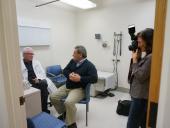The California Center for Pituitary Disorders (CCPD) at UCSF was established four years ago as a multidisciplinary center designed to provide comprehensive care to all patients with newly diagnosed and pre-existing pituitary disorders. The program was built on decades of recognized excellence in neurosurgical care and research at UCSF.
News
Historically, pituitary tumors have been classified as carcinomas if they spread to other tissues in a discontinuous fashion. This implies that a metastasis confirmed and documented by biopsy must be present in a patient with a pituitary tumor before a diagnosis of cancer can be made.
Transsphenoidal surgery is the initial treatment of choice for most patients with proved or highly suspected Cushing’s disease. Published reports demonstrate that at experienced centers, such as the California Center for Pituitary Disorders at UCSF, remission following surgery can be expected in 80 to 90% of patients with microadenomas and 50 to 60% of patients with macroadenomas. Recurrent hypercortisolism can be expected in approximately 10% of patients with microadenomas and 30% of patients with macroadenomas who enter remission after surgery.
Transsphenoidal surgery remains the treatment of choice for most patients with acromegaly. Optimal management of the 10 to 50% of patients who do not undergo remission after transsphenoidal surgery and the 20% of patients who experience recurrence of acromegaly after initial transsphenoidal surgery remains less clear. Radiation represents an evolving treatment for acromegaly that warrants consideration as an alternative to medical therapy for cases refractory to transsphenoidal surgery.



